直接引语和间接引语(陈述句和疑问句)Grammar
Grammar直接引语与间接引语
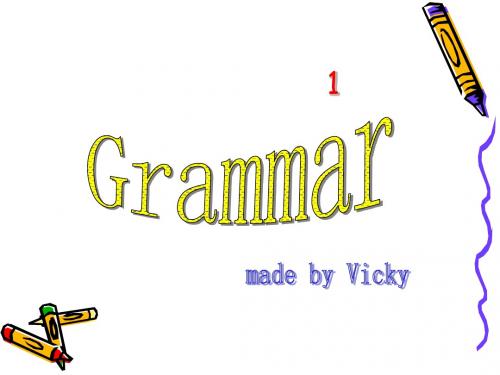
He asked , “Can I borrow your bike?”
He asked whether/if he could borrow my bike.
Tom said to me, “Do you like football?”
Tom asked me whether/if I liked football.
He said that he liked it very much. He said to me,“I’ve left my book in your room.”
He told me that he had left his book in my room.
直接引语中的状语
间接引语中的状语
状 语 变 化
My brother said to me, “I’m going to have a holiday next week.
My brother told me he was going to have a holiday the next week.
Mother said to me, “What are you doing in the room?” Mother asked me what I was doing in the room.
直接引语为疑问句时变间接引语的句型变化:
直接引语为疑问句时,变为间接引语时除注意在人称、 时态和状语等方面相应变化外,还应注意:
• 间接引语应改为陈述语序。 • 特殊疑问句的疑问词应保留。 • 一般疑问句、选择疑问句和反意疑问句在变为间接引语时要用连 词whether(或if)。 “Is there something wrong,Madam?”asked the policeman. The policeman asked the woman whether/if there was something wrong. She asked, “What it is? What’s going to happen now?” She asked what it was and what was going to happen then. “It’s Mary,isn’t it?”asked Jane. Jane asked whether it was Mary.
(完整版)英语语法----直接引语和间接引语
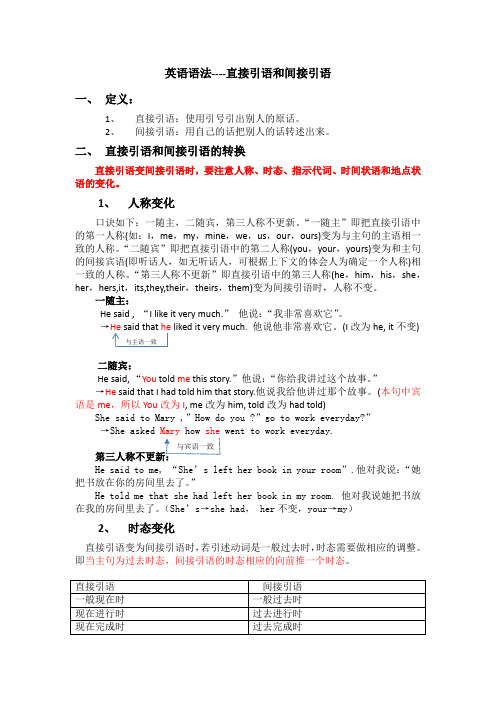
英语语法----直接引语和间接引语一、 定义:1、 直接引语:使用引号引出别人的原话。
2、间接引语:用自己的话把别人的话转述出来。
二、 直接引语和间接引语的转换直接引语变间接引语时,要注意人称、时态、指示代词、时间状语和地点状语的变化。
1、 人称变化口诀如下:一随主,二随宾,第三人称不更新。
“一随主”即把直接引语中的第一人称(如:I ,me ,my ,mine ,we ,us ,our ,ours)变为与主句的主语相一致的人称。
“二随宾”即把直接引语中的第二人称(you ,your ,yours)变为和主句的间接宾语(即听话人,如无听话人,可根据上下文的体会人为确定一个人称)相一致的人称。
“第三人称不更新”即直接引语中的第三人称(he ,him ,his ,she ,her ,hers,it ,its,they,their ,theirs ,them)变为间接引语时,人称不变。
一随主:He said , “I like it very much.” 他说:“我非常喜欢它”。
→liked it very much. 他说他非常喜欢它。
(I 改为he, it 不变)二随宾:He said, “You told me this story.”他说:“你给我讲过这个故事。
”→He said that I had told him that story.他说我给他讲过那个故事。
(本句中宾语是me ,所以You 改为I , me 改为him, told 改为had told)She said to Mary ,”How do you ?”go to work everyday?” →She asked Mary how she went to work everyday. 第三人称不更新:He said to me, “She’s left her book in your room ”.他对我说:“她把书放在你的房间里去了。
《Grammar and usage》 知识清单

《Grammar and usage》知识清单一、词类(Parts of Speech)1、名词(Noun)普通名词(Common Noun):如“book”(书)、“table”(桌子)。
专有名词(Proper Noun):如“China”(中国)、“Tom”(汤姆)。
可数名词(Countable Noun)和不可数名词(Uncountable Noun):可数名词有复数形式,如“apples”;不可数名词没有复数形式,如“water”。
2、动词(Verb)及物动词(Transitive Verb)和不及物动词(Intransitive Verb):及物动词后需接宾语,如“eat an apple”;不及物动词后不接宾语,如“sleep”。
动词的时态(Tenses):包括一般现在时(Simple Present Tense)、一般过去时(Simple Past Tense)、一般将来时(Simple Future Tense)、现在进行时(Present Continuous Tense)、过去进行时(Past Continuous Tense)、现在完成时(Present Perfect Tense)、过去完成时(Past Perfect Tense)等。
3、形容词(Adjective)形容词用于描述或修饰名词,如“beautiful girl”(漂亮的女孩)。
形容词的比较级(Comparative Degree)和最高级(Superlative Degree):如“taller”(更高的)、“the tallest”(最高的)。
4、副词(Adverb)副词用于修饰动词、形容词或其他副词,如“run fast”(跑得快)、“very beautiful”(非常漂亮)。
副词的比较级和最高级:如“more carefully”(更仔细地)、“most carefully”(最仔细地)。
5、代词(Pronoun)人称代词(Personal Pronoun):如“I”(我)、“you”(你)、“he”(他)等。
直接引语和间接引语语法
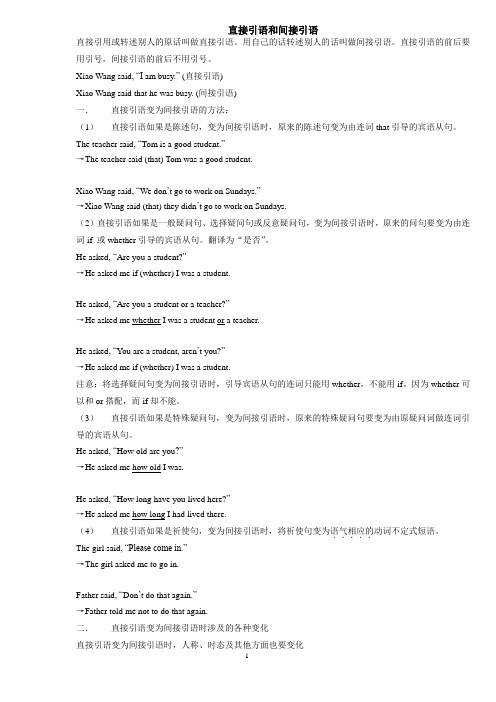
直接引语和间接引语直接引用或转述别人的原话叫做直接引语。
用自己的话转述别人的话叫做间接引语。
直接引语的前后要用引号,间接引语的前后不用引号。
Xiao Wang said, “I am busy.” (直接引语)Xiao Wang said that he was busy. (间接引语)一.直接引语变为间接引语的方法:(1)直接引语如果是陈述句,变为间接引语时,原来的陈述句变为由连词that引导的宾语从句。
The teacher said, “Tom is a good student.”→The teacher said (that) Tom was a good student.Xiao Wang said, “We don’t go to work on Sundays.”→Xiao Wang said (that) they didn’t go to work on Sundays.(2)直接引语如果是一般疑问句、选择疑问句或反意疑问句,变为间接引语时,原来的问句要变为由连词if 或whether引导的宾语从句。
翻译为“是否”。
He asked, “Are you a student?”→He asked me if (whether) I was a student.He asked, “Are you a student or a teacher?”→He asked me whether I was a student or a teacher.He asked, “You are a student, aren’t you?”→He asked me if (whether) I was a student.注意:将选择疑问句变为间接引语时,引导宾语从句的连词只能用whether,不能用if。
因为whether可以和or搭配,而if却不能。
(3)直接引语如果是特殊疑问句,变为间接引语时,原来的特殊疑问句要变为由原疑问词做连词引导的宾语从句。
高中英语直接引语和间接引语

直接引语和间接引语一、直接引语变间接引语A.陈述句的间接引语直接引语是陈述句,变为间接引语时,在多数情况下都构成一个that引导的宾语从句,引述动词通常是say, tell等。
与此同时,间接引语中的人称、时态和其他方面也要相应有所变化。
She said, We are very fond of sports. 她说:我们都喜欢体育运动。
→ She said that they were very fond of sports. 她说他(她)们都喜欢体运动。
I'll go over the grammar lesson once again, he said. 他说:我将把语法课再复习一遍。
→ He said he would go over the grammar lesson once again. 他说他将要把语法课再复习一遍。
(that可省略)B.疑问句的间接引语1.一般疑问句和反意疑问句一般疑问句改为间接引语时,要用陈述语序,并要加连词if 或whether,其主句动词常用ask, wonder, want to know, didn't know等。
句末不用问号。
My teacher asked me, Do you like American country music 我老师问我:你喜欢美国乡村音乐吗?→ My teacher asked me if/whether I liked American country music. 我老师问我是否喜欢美国乡村音乐。
You haven't been to Beijing, have you asked he. 他问:你没去过北,是吗?→ He asked me if/whether I had been to Beijing. 他问我是否去过北京。
2.否定的一般疑问句和选择问句如果直接引语为否定的一般问句或选择疑问句时,用whether…or 连接。
Grammar直接引语和间接引语

Grammar直接引语和间接引语Direct Speech & Indirect SpeechDefinition引述或转述别人的话称为“引语”。
直接引语:直接引用别人的原话(两边用引号“ ”标出)间接引语:用自己的语言转述别人的话(不需要引号)直接引语转换为间接引语时,…要有变化,如何变化呢?句子的结构,人称、时态、时间状语和地点状语等都要有变化(一)人称的转变He said, “I am very sorry. ”She said to her son, “I'll check your homework tonight. ”“You should be more careful next time, ” my father told me.He said that he was very sorry.She said to her son that she would check his homework that night.My father told me that I should be more careful the next time.人称的转换不是固定的,具体情况,具体对待,要符合逻辑。
(二)时态的转换“I am very glad to visit your school”, she said.She said she was very glad to visit our school.Tom said, “We are listening to the pop music. ”Tom said that they were listening to the pop music.Mother asked, “Have you finished your homework before you watch TV?”Mother asked me whether I had finished my homework before I watched TV. Conclusion直接引语改为间接引语时,主句中的谓语动词如果是过去时,从句(即间接引语部分)的谓语动词在时态方面要作相应的变化,变成过去时范畴的各种时态: 一般现在时 一般过去时现在进行时 过去进行时现在完成时 过去完成时一般将来时 过去将来时一般过去时 过去完成时过去完成时 不变过去进行时 不变(三)时间状语、地点状语及某些对比性的指示代词和动词变化Now…thenToday…that dayYesterday…the day beforelast week(month)..the week(month)beforeTomorrow…the next(following)daynext year…the year beforetwo days ago…two days beforeThis…thatThese…thoseHere…thereCome…goBring…take(四) 从句时态无须改变的情况He always says, “I am tired out. ”He always says that he is tired out.He will say, “I’ll try my best to help you. ”He will say that he will try his best to help me.He said, “I went to college in 1994. ”He told us that he went to college in 1994.He said,“When I was a child, I usually played football after s chool. ”He said that when he was a child, he usually played football after school.Our teacher said to us, “Light travels faster than sound. ”Our teacher told us that light travels faster than sound.He said,“Practice makes perfect. ”He said that practice makes perfect.He said, “She must be a teacher. ”He said that she must be a teacher.The doctor said, “You'd better drink plenty of water. ”The doctor said I'd better drink plenty of water.Conclusion1. 当主句的谓语动词是一般现在时的时候2. 当主句的谓语动词是将来时的时候3. 当直接引语部分带有具体的过去时间状语时4. 当直接引语中有以when, while引导的从句,表示过去的时间时5. 当直接引语是客观真理或自然现象时6. 当引语是谚语、格言时7. 当直接引语中有情态动词should, would, could, had better, would rather, might,must, ought to, used to, need时(五)直接引语变成间接引语,句子结构的变化陈述句He said, “I have been to the Great Wall. ”He said to us that he had been to the Great Wall.He said, “I'll give you an examination next Monday. ”He told us that he would give us an examination the next Monday.用连词that引导,that在口语中常省略。
直接引语和间接引语(陈述句和疑问句)Grammar

1. She often says, “All men and women are equal under the law.” 1. She often says (that) all men and women are equal under the law.
1. 直接引语转变为间接引语时, 从句由 that引导, 可省略; 主句动词为一般将 来时或现在时, 从句动词时态不变。
一般现在时 现在完成时 现在进行时 一般将来时 一般过去时
过去完成时
一般过去时 过去完成时 过去进行时 过去将来时 过去完成时
不变
1. “It is really cold,” she said to me. She told me that it ____ was really cold. 2. “I don’t want to go there with Alice,”
直接引语(变化前)
一般过去时 “I saw her last Monday,” he said.
间接引语(变化后)
过去完成时 He said he had seen her the previous Monday.
直接引语(变化前) 一般将来时 He said: “We shall start tomorrow.” 过去完成时
直接引语(变化前) 现在完成时 “I have seen her before,” said he. 现在完成进行时 He said, “I have been doing it for hours.”
间接引语(变化后) 过去完成时 He said he had seen her before. 过去完成进行时 He said he had been doing it for hours.
直接引语和间接引语Ⅰ ( 陈述句和疑问句)

直接引语和间接引语Ⅰ(陈述句和疑问句)教学目标:一.知识目标:掌握直接引语和间接引语的概念。
学会区分直接引语和间接引语。
二.能力目标掌握当直接引语是陈述句和疑问句时,该怎样将直接引语转化成间接引语。
掌握直接引语便间接引语时,时态的变化。
熟练在直接引语和间接引语之间进行转化。
教学重点:时态的变化指示代词,时间状语,地点状语和动词的变化。
间接引语时态不作改变的情况教学难点:准确无误地将直接引语转化成间接引语。
教学方法:教学步骤:一.引入新课我们在生活中,经常会遇到这种情况:我们请别人帮我们传达信息;别人请我们传达信息。
在这样的情况下,用怎么样的方法才能时需要传达的信息不会变质呢?如:今天,一位学生家长带着自己正在念初三的学生来到恒名教育,想向蒲老师打听一下收费情况及具体的课时安排。
结果,不巧,蒲老师出去了只有等到第二天才回来,等蒲老师回来后,你该怎样转述家长的话给蒲老师呢/二.新课教学(一)出示本节课的学习目标(二)学习目标完成过程变直接引语为间接引语时,应注意以下事项:(1)句型的变化①直接引语为陈述句时,下列情况中的that不可省略:当宾语从句作直接宾语时。
当宾语从句中的状语置于从句句首时。
当两个或两个以上的宾语从句并列时,仅能省略第一个that,其余的不可省略。
②直接引语为一般疑问句,变为间接引语时,宾语从句有whether或if引导。
He said, “Can you come this afternoon?”→He asked whether/if John could come that afternoon.③特殊疑问句变为由who, what, when等疑问词引导的宾语从句。
He said, “Where is Mr Wang?”→He asked where Mr Wang is.④直接引语是祈使句时,应注意常变为ask/tell/order sb. to do sth.句型。
若是以let’s 开头的祈使句,则通常变为suggest doing或suggest+从句的形式。
Unit1 Section Ⅲ Grammar——直接引语和间接引语(Ⅰ)

(3)在句 10 中,直接引语中的 here 和 the day before yesterday 在间 接引语中分别变为 there 和 two days before ;同时在主句和从句之 间加入了连接词 that。 (4)直接引语是一般疑问句或反意疑问句,变为间接引语时,常将 它变成由 if 或 whether 导的宾语从句,其主句动词常用 ask 。如 句 2、6、11。 (5)直接引语为特殊疑问句,变为间接引语时,将它变成由原来的 疑问词 引导的宾语从句。如句 7、12。 (6)语序变化:直接引语如果是疑问句,变为间接引语时,要把疑 问句语序变为 陈述句语序 。如句 2、3、4、6、7、11、12。
一、人称的变化 直接引语变为间接引语时,人称代词要根据转述人立场的变 化作相应的改变。 [助记] 直接引语变间接引语人称变化口诀:
“一随主,二随宾,第三人称不更新。”
1.“一随主”。 指在直接引语变间接引语时,直接引语 中出现的第一人称的代词要按照引述动词的主语的人称变化。
John said,“I want to visit the World Expo.” →John said that he wanted to visit the World Expo. She said,“My brother wants to go with me.” →She said her brother wanted to go with her.
•9、要学生做的事,教职员躬亲共做;要学生学的知识,教职员躬亲共学;要学生守的规则,教职员躬亲共守。2021/8/312021/8/31Tuesday, August 31, 2021 •10、阅读一切好书如同和过去最杰出的人谈话。2021/8/312021/8/312021/8/318/31/2021 1:03:45 AM •11、只有让学生不把全部时间都用在学习上,而留下许多自由支配的时间,他才能顺利地学习……(这)是教育过程的逻辑。2021/8/312021/8/312021/8/31Aug-2131-Aug-21 •12、要记住,你不仅是教课的教师,也是学生的教育者,生活的导师和道德的引路人。2021/8/312021/8/312021/8/31Tuesday, August 31, 2021
Grammar_20_直接引语和间接引语
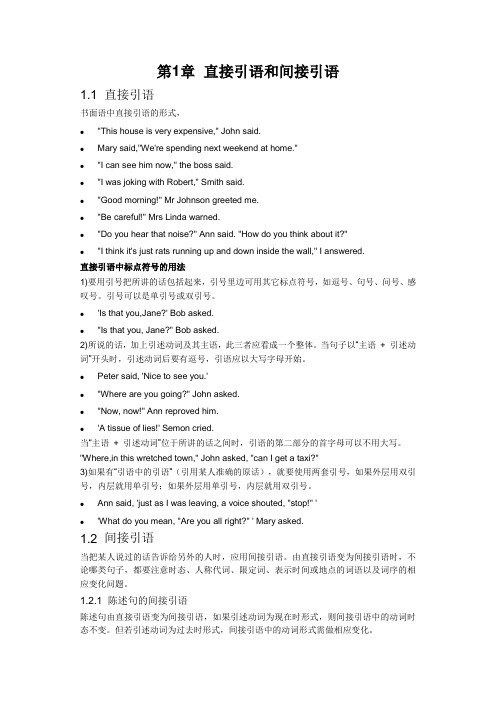
第1章直接引语和间接引语1.1 直接引语书面语中直接引语的形式,●"This house is very expensive," John said.●Mary said,"We're spending next weekend at home."●"I can see him now," the boss said.●"I was joking with Robert," Smith said.●"Good morning!" Mr Johnson greeted me.●"Be careful!" Mrs Linda warned.●"Do you hear that noise?" Ann said. "How do you think about it?"●"I think it's just rats running up and down inside the wall," I answered.直接引语中标点符号的用法1)要用引号把所讲的话包括起来,引号里边可用其它标点符号,如逗号、句号、问号、感叹号。
引号可以是单引号或双引号。
●'Is that you,Jane?' Bob asked.●"Is that you, Jane?" Bob asked.2)所说的话,加上引述动词及其主语,此三者应看成一个整体。
当句子以“主语+ 引述动词”开头时,引述动词后要有逗号,引语应以大写字母开始。
●Peter said, 'Nice to see you.'●"Where are you going?" John asked.●"Now, now!" Ann reproved him.●'A tissue of lies!' Semon cried.当“主语+ 引述动词”位于所讲的话之间时,引语的第二部分的首字母可以不用大写。
21-22版:Grammar——直接引语和间接引语(Ⅱ)(创新设计)

本节内容结束
8
4
@《创新设计》
3.有些表示建议、要求或劝告的祈使句变间接引语时,可用suggest,insist,offer等 动词加以转述,此时要注意这些词的固定搭配。 He said,“Let’s go to the museum.” →He suggested that we (should) go to the museum. 他建议我们去博物馆。
6Leabharlann @《创新设计》[名师点津] 若疑问句表达的是“建议,劝告”等意思,则可采用advise sb to do sth 或suggest doing的形式。 “Why don’t you take a break first?”he said. →He advised me to take a break first. 他建议我先休息会儿。 “What about having a drink?”he said. →He suggested having a drink. 他建议喝一杯。
5
@《创新设计》
4.有些疑问句并非提出询问,而是表示请求和乞求,这种疑问句变间接引语时常采 用ask/beg/request sb to do sth结构。 “Can you possibly give me a lift?”he said. →He asked me to give him a lift. 他请求我让他搭便车。 “Would/Could/Will you (please) help me with my work?”he said. →He requested me to help him with his work. 他请求我帮他完成工作。
3
@《创新设计》
2.当祈使句表示请求时,变间接引语常采用request/beg/ask sb to do sth的形式。祈使 句中的please在间接引语中必须省去。 “Please don’t come late,”he said. →He asked me not to go late. 他叫我不要去晚了。 “Come here and sit down,please.”he said. →He asked me to go there and sit down. 他叫我去那儿坐下。
Grammar-Direct and Indirect Speech (1)

直接引语和间接引语可分为三大类:
1)陈述句 2) 疑问句(一般疑问句、 特殊疑问句) 3)祈使句
*还包括:感叹句
一 )直接引语是陈述句用 say ,tell ,repeat ,explain . Think …. e.g. He said ,”you are younger than I.” ----He said (that) I was younger than him.
5)直接引语是感叹句时
间接引语为what或how引导,也 可以用that引导
e.g. She said ,”What a lovely day it is !” ----She said what a lovely day it was .
7.The doctor said, “Let’s start the work at once.” -----The doctor advised that his man should start the work at once .=The doctor advised his man to start the work at once .
2) 选择疑问句要用whether引 导的宾语从句转换 e.g. I asked him ,”Will you stay at home or go to a film tonight?” ----I asked him whether he would stay at home or go to a film that night .
4)直接引语变为祈使句,间接引语 要用不定式。 一般用 ask ,tell ,beg .order ,warn .advis e etc. e.g. The teacher said to the boy ,”Open the window .” -----The teacher told the boy to open the window .
Grammar-- 直接引语变间接引语

?
She said
they would go shopping.
直接引语变为间接引语 1.(Gina) I will call you on Sunday. Gina said she would call me on Sunday. 2.(Tony) I go camping every week. Tony said he went camping every week.
we It said to us you were playing football.
三不变 She said, “He finished his homework .”
She said he had finished his homework.
They will go shopping .
What did she say
3.(Linda) I am upset at my report card.
Linda said she was upset at her report card. 4.(Tanya) I am learning to speak English. Tanya said she was learning to speak English. 5.(Kenji) I will go to Sam’s house Friday night.
时 间
直接引语
now
→
间接引语
then
today Yesterday
the day before
that day the day before
two days before
this week (month, etc.) that week (month, etc.)
2019-2020英语必修四讲义:Unit 1 Section Ⅲ Grammar——直接引语和间接引语 含答案
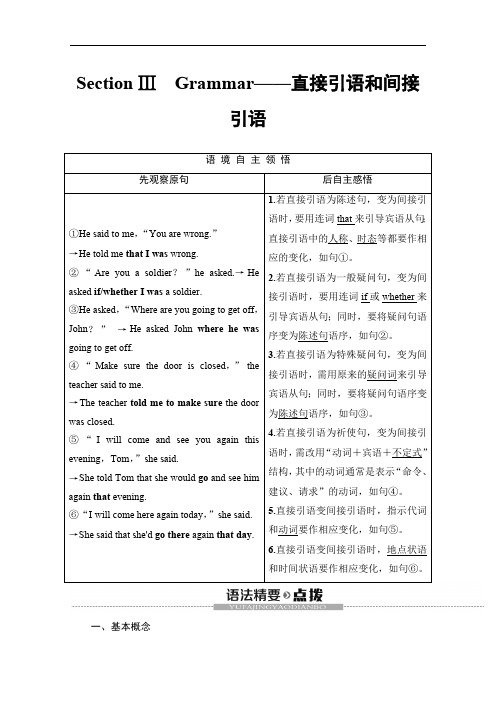
Section Ⅲ Grammar——直接引语和间接引语语境 自 主 领 悟先观察原句后自主感悟①He said to me ,“You are wrong.”→He told me that I was wrong.②“Are you a soldier ?”he asked.→He asked if/whether I was a soldier.③He asked ,“Where are you going to get off ,John ?” →He asked John where he was going to get off.④“Make sure the door is closed ,”the teacher said to me.→The teacher told me to make sure the doorwas closed.⑤“I will come and see you again thisevening ,Tom ,”she said.→She told Tom that she would go and see himagain that evening.⑥“I will come here again today ,”she said.→She said that she'd go there again that day . 1.若直接引语为陈述句,变为间接引语时,要用连词that 来引导宾语从句;直接引语中的人称、时态等都要作相应的变化,如句①。
2.若直接引语为一般疑问句,变为间接引语时,要用连词if 或whether 来引导宾语从句;同时,要将疑问句语序变为陈述句语序,如句②。
3.若直接引语为特殊疑问句,变为间接引语时,需用原来的疑问词来引导宾语从句;同时,要将疑问句语序变为陈述句语序,如句③。
4.若直接引语为祈使句,变为间接引语时,需改用“动词+宾语+不定式”结构,其中的动词通常是表示“命令、建议、请求”的动词,如句④。
18 19 Unit 1 Section Ⅲ Grammar直接引语和间接引语

Section ⅢGrammar——直接引语和间接引语一、基本概念两边用引号标出,直接引用别人的原话,引述或转述别人的话称为“引语”。
叫作直接引语。
用自己的语言转述别人的话,不需要引号的叫作间接引语。
直接引语变为间接引语时,需在时态形式、人称代词、指示代词、限定词、时间状语、地点状语以及语序等方面做相应的变化。
)”,I like singing“she said.(直接引语页 1 第→She said she liked singing.(间接引语)她说她喜欢唱歌。
“Don't touch anything,”he said.(直接引语)→He told us not to touch anything.(间接引语)他告诉我们不要碰任何东西。
二、直接引语变为间接引语时各种句式的转换1.引述陈述句时,用连词that引导(that在口语中常被省略。
),主句动词主要用say,tell,repeat,answer,reply,explain,announce,declare.think等。
He said,“I like it very much.”→He said that he liked it very much.他说他非常喜欢它。
He said,“I've left my book in your room.”→He told me that he had left his book in my room.他告诉我他把书忘在我房间里了。
2.引述一般疑问句或附加疑问句时,通常用whether或if引导,而引述选择疑问句时,一般只能用whether引导。
原句中的谓语动词said要改为asked,语序用陈述句语序。
He asked,“Are you sure your mother will come?”→He asked me whether/if I was sure my mother would come.他问我是否确信我妈妈会来。
八下四单元词汇语法笔记

Unit Four He said I was hard-workingGrammar直接引语和间接引语1.陈述句.用连词that引导,that在口语中常省略。
主句的谓语动词可直用接引语中的said, 也可用told来代替,注意,可以说said that, said to sb. that, told sb. that,不可直接说told that, 如:He said, “I have been to the Great Wall.”He said to us that he had been to the Great Wall.He said, “I'll give you an examination next Monday.”He told us that he would give us an examination the next Monday. (不可说told that)2.疑问句.疑问句语序改为陈述句语序, 句末用句号, 主语的人称,时态和状语也要作相应的变化.(1)一般疑问句: 用连词whether或if 引导.主句中的谓语动词是said 时,要改为asked.没有间接宾语的,可以加一个间接宾语 (me,him或us等).He said, “Are you interested in English?”He asked (me) if/whether I was interested in English.He said, “Did you see him last nigh?”He asked (me) if/whether I had seen him the night before.(2)特殊疑问句: 仍用原来的疑问句引导.“What can I do for you?” he asked me.He asked (me) what he could do for me.(3)选择疑问句:直接引语如果是选择疑问句, 用whether引导.She asked, “Are you going there or not?”She asked me whether I was going there or not.3.祈使句:改为tell,ask,order sb (not) to do sth 句型,表示命令。
Book 1 Unit 1-2 Grammar 直接引语和间接引语
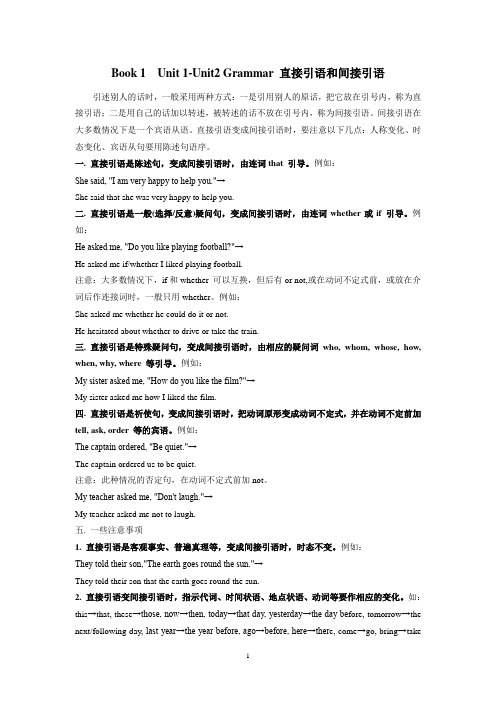
Book 1 Unit 1-Unit2 Grammar 直接引语和间接引语引述别人的话时,一般采用两种方式:一是引用别人的原话,把它放在引号内,称为直接引语;二是用自己的话加以转述,被转述的话不放在引号内,称为间接引语。
间接引语在大多数情况下是一个宾语从语。
直接引语变成间接引语时,要注意以下几点:人称变化、时态变化、宾语从句要用陈述句语序。
一. 直接引语是陈述句,变成间接引语时,由连词that 引导。
例如:She said, "I am very happy to help you."→She said that she was very happy to help you.二. 直接引语是一般(选择/反意)疑问句,变成间接引语时,由连词whether或if 引导。
例如:He asked me, "Do you like playing football?"→He asked me if/whether I liked playing football.注意:大多数情况下,if和whether 可以互换,但后有or not,或在动词不定式前,或放在介词后作连接词时,一般只用whether。
例如:She asked me whether he could do it or not.He hesitated about whether to drive or take the train.三. 直接引语是特殊疑问句,变成间接引语时,由相应的疑问词who, whom, whose, how, when, why, where 等引导。
例如:My sister asked me, "How do you like the film?"→My sister asked me how I liked the film.四. 直接引语是祈使句,变成间接引语时,把动词原形变成动词不定式,并在动词不定前加tell, ask, order 等的宾语。
直接引语和间接引语

10
When you change a sentence from direct speech to indirect speech, you sometimes need to change the verb tense. You may also need to change pronouns , time in order to keep the
7. “Have you been to Paris?” My classmate asked me. My classmate asked me if I had been to Paris.
18
19
Reading-II----Detailed reading (5m)
Read the text again and answer the following questions.
1. What is the first way Hawaiians show their friendship?
2. What is the second way of showing friendship? 3. What is their third way of showing friendship? 4. Why do many different peoples call Hawaii
How do you show friendship to visitors? 20
1. What is the first way Hawaiians show their friendship?
Hawaiians say “aloha” to each other to show friendship.
- 1、下载文档前请自行甄别文档内容的完整性,平台不提供额外的编辑、内容补充、找答案等附加服务。
- 2、"仅部分预览"的文档,不可在线预览部分如存在完整性等问题,可反馈申请退款(可完整预览的文档不适用该条件!)。
- 3、如文档侵犯您的权益,请联系客服反馈,我们会尽快为您处理(人工客服工作时间:9:00-18:30)。
直接引语(变化前)
一般过去时 “I saw her last Monday,” he said.
间接引语(变化后)
过去完成时 He said he had seen her the previous Monday.
直接引语(变化前) 一般将来时 He said: “We shall start tomorrow.” 过去完成时
3. “Have you seen our plane yourself?” he asked the boy. He asked the boy whether _______ he __ had ___ ____ seen _____ their plane _______. himself 4. The teacher asked her, “Does the sun rise in the east?” The teacher asked her ________ whether the rises in the east. sun _____
2. “I like reading stories,” said John. John said that he liked reading stories. 3. “I don’t like cars,” Sarah said to him. Sarah told him that she didn’t like cars.
2. 直接引语转变为间接引语时,人称要 进行相应变化;且主句动词为一般过 去时时,从句动词时态应为过去时的 相应时态。
1.人称的变化
直接引语里的第一人称和第二人称,变间
接引语时,人称要做相应调整。
1. She said: “I am hungry.”
She said she was hungry.
“Rick had been ill for many days till he died.” Jack said.
间接引语(变化后) 过去将来时 He said they would start the next day. 过去完成时
Jack said Rick had been ill for many days till he died.
1. She often says, “All men and women are equal under the law.” 1. She often says (that) all men and women are equal under the law.
1. 直接引语转变为间接引语时, 从句由 that引导, 可省略; 主句动词为一般将 来时或现在时, 从句动词时态不变。
2. Mum said to me:“ You can do it yourself.” Mum told me that I could do it myself. 3. Mr. Smith said, “He is a good worker.’’ Mr. Smith said that he was a good worker.
was
They asked if it was easy to solve the problem.
He asked,“ When do you harvest the wheat? ” He asked when you harvest the wheat. we harvested
They asked when we harvested the wheat.
一般现在时 现在完成时 现在进行时 一般将来时 一般过去时
过去完成时
一般过去时 过去完成时 过去进行时 过去将来时 过去完成时
不变
1. “It is really cold,” she said to me. She told me that it ____ was really cold. 2. “I don’t want to go there with Alice,”
4. Tom said, “We are listening to music.”
Tom said that they ______________ were listening to music. 5. Mike said, “I have finished my homework.”
Mike said he _____________ had finished his homework.
Exercise
1. “I never eat meat.” he said. he never ______ ate meat. He said that ______ 2. “I’ve found my wallet.” he said to me. told me that he ______ had ______ found ______ his wallet. He ______ 3. “I took it home with me.” she said. she ______ had _______ taken it home with her. She said that ______ 4. The teacher said, “The sun rises in the east and goes down in the west.” rises in the east and ______ goes down The teacher said that the sun ______ in the west. 5. “I met her yesterday.” he said to me. told me that he ______ had met the day ______. before He ______ 7. “I bought the house 10 years ago.” he said. He said that he _______ had bought the house 10 years _______. before
He says that he treats me as his son.
2. 当主句为过去时, 从句要跟着相应的变化。
直接引语(变化前) 一般现在时 “I know it,” he said. 现在进行时 “I’m making coffee for you all,” she said. 间接引语(变化后) 一般过去时 He said he knew it. 过去进行时 She said she was making coffee地点状语
this
these
间接引语
that
those
here
come bring
there
go take
方向性动词
They asked, “Is it easy to solve the problem?”
They asked if / whether it is easy to solve the problem
said Tom. Tom said that he ______ didn’t want to go
there with Alice.
3. The boy said: “I will be a pilot.”
The boy said that he ________ would be a pilot.”
1. Jack said to me, “You look worried today.” Jack told me that __ I looked worried that day. 2. We said to her, “They’re cleaning the room.” they were cleaning the room. We told her that ____ 3. Mr. Black said, “I have walked a long way.”
3.其他变化
now today this week yesterday last week four days ago tomorrow next month the day after tomorrow the day before yesterday
直接引语
间接引语
then that day that week the day before the week before four days before the next day the next month in two days’ time two days before
8. “Did you see her last week?” he said. if asked ______ before He ______ I had seen her the week _______. 9. He said, “You can sit here, Jim.” told Jim that he ______ could sit there He ______ 10. He asked, “How did you find it, mother?” how ______ she had found it. He asked her mother ______ ______ 11. “Where have you been these days?” he asked. where _______ I had those days. He asked me _______ _______been _______ 12. “Do you know where she lives?” he asked. if I lived He asked ______ ______ knew where she ______. 13. “Are you interested in English or French?” he said. He ______ I was interested in English or French asked __________ whether
